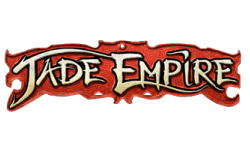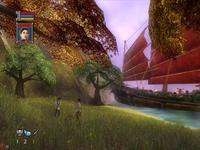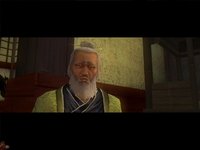|
|

|
PLATFORM
|
Xbox
|
BATTLE SYSTEM
|

|
INTERACTION
|

|
ORIGINALITY
|

|
STORY
|

|
MUSIC & SOUND
|

|
VISUALS
|

|
CHALLENGE
|
Adjustable
|
COMPLETION TIME
|
20-40 Hours
|
|
OVERALL

|
+ Unique martial arts combat system
+ Asian-inspired but designed for a western audience
+ Lots and lots of great sidequests
+ Sir Roderick Ponce von Fontlebottom the Magnificent Bastard
- Combat can sometimes feel slow
- Characters aren't terribly interesting
|
Click here for scoring definitions
|
|
|
As Keanu Reeves once so eloquently put it, "I know kung fu." Well, not really, but thanks to BioWare's Chinese-inspired roleplaying epic, it's very easy to pretend. Swords and sorcery, spirits and demons, myths and legends, and enough butt-kicking to satisfy the most rabid Bruce Lee fan: Jade Empire has them, and more. Inspired by Chinese history, mythology, and legend, BioWare has created a remarkable fictional world that feels incredibly close to the real thing.
Jade Empire puts the player in the role of an orphaned martial arts student who has been training with his Master for twenty long years. When his village is attacked and his Master is kidnapped, the orphan-warrior sets out to rescue him, at the same time seeking to fulfill his destiny. Much like the kung fu movies it takes its inspiration from, the plot of Jade Empire is not particularly spectacular. Plot twists are generally expected, characters are, for the most part, relatively uninteresting, although often amusing, but despite that, the game easily takes hold thanks to its innumerable side quests and living world. This is something of a staple with BioWare games, so it shouldn't come as much of a shock.
Despite not having a terribly intriguing plot, the sidequests that are so often the highlight of BioWare games are no different in this case, and there are a lot of them. These extra bits of story help to fill out the world and often introduce intriguing minor characters or create bizarre and unusual situations for the protagonist. The sheer number that exist can be somewhat overwhelming, and players can expect to spend several hours running through new cities discovering them. While it's possible to skip them and move on with the story, the rewards, which can include experience and even new fighting styles, are often too good to pass up.
 The environments can be extremely impressive.
The environments can be extremely impressive.
|
|
A kung fu game wouldn't be much without some kung fu, and the combat system in Jade Empire provides plenty. The player can attack, defend, and dodge at will, but most importantly, he can change martial arts styles throughout a fight, and this provides the most interesting aspect of battle. Each character starts out with two predetermined styles, but can learn over twenty throughout the course of the game. Furthermore, styles are broken down into several different categories. Martial styles are standard kung fu techniques involving kicks and punches, while weapon styles provide a more deadly arsenal. There are also magic styles, transformation styles, and support styles that cause various status ailments. Switching between styles, experimenting, and finding different combinations is half the fun. The combat is made all the more interesting by the fact that certain enemies are immune to certain styles. For example, the undead are immune to weapons and must be taken down with martial styles. Demons are immune to magic and support styles, but easily slaughtered by a powerful weapon. Each level, points are granted that can be spent to upgrade the styles, adding another level of customization and strategy. With the amount of options and strategy the combat provides, it is very enjoyable, but unfortunately often feels rather sluggish, particularly when compared to other action RPGs. The main character always walks while in combat, which can make closing the distance for close-range attacks frustrating at times. Luckily, the dodge option provides a lot more speed, and most players will probably find themselves jumping and rolling all over the place.
Unlike most RPGs, Jade Empire is virtually devoid of a stat system. As far as one can tell, damage is determined solely by character level and style upgrades. There are only three numbered stats in the game, representing the player's three depletable pools of energy: health, chi, and focus. While health is fairly self-explanatory, chi and focus are a bit stranger and deviate from what exists in most RPGs. Chi is essentially a form of mana, but has a wider array of uses. In addition to being drained while using magic styles, it can also be manually drained to restore health. The player also learns a special style called Chi Strike as part of the story that can recover chi during battle, an incredibly useful ability. The other stat, focus, is used with weapon styles. All weapon attacks drain focus, but unfortunately, there are very few ways to restore it during battle. While this limits how often weapons can be used, their sheer destructive power and additional range make them extraordinarily useful.
In addition to the main character's own martial prowess, various allies with different strengths and weaknesses join him on his crusade. While most of these allies are able to fight, some have other, less confrontational skills. In essence, any ally can be set to fight with or support the main character. While in support mode, the ally stays out of combat, but provides some other effect such as restoring health, chi, or focus. One ally throws wine bottles, allowing the player to make use of the Drunken Master style. There are many allies in the game, some fighters and some not, but sadly only one can accompany the player at a given time. With two separate modes allies can assist in, it seems strange that only one can do so.
 Wow! Hair that looks like hair! What changed in two years, BioWare?
Wow! Hair that looks like hair! What changed in two years, BioWare?
|
|
While Jade Empire's world is brought to life mainly by the activity throughout the world, the visuals do wonders to enhance it. The architecture is classic Chinese, as are the character designs. The outdoor environments are also quite beautiful, and still hold up several years later. One amusing note is the fact that character hair actually looks remarkably better than it does in BioWare's later, Xbox 360 game Mass Effect.
The audio experience is equally enjoyable. The music is easy to listen to and quite enjoyable, but it's the voice acting that really stands out. While the voice acting throughout is quite good, the game provides several surprise appearances from well known actors. Among these are Firefly's Nathan Fillion, and even more surprising, Monty Python's John Cleese, playing the pompous, English dandy Sir Roderick Ponce von Fontlebottom the Magnificent Bastard, a character quite possibly modeled after RPGamer's very own Shawn "Lusipurr" Cooper.
All things considered, Jade Empire is a very good game, but it could have been better. The game doesn't really have any flaws that detract from it, overall, but somehow, it just doesn't feel quite as complete as the developer's other work. Perhaps it's the sluggishness of the combat system or the less than stellar characters, but something feels like it's missing. However, despite that, the game is still enjoyable enough not to pass up, and at a price of only fifteen dollars on Xbox Live Originals, it's a real deal as well. Jade Empire only runs for about twenty hours, but thanks to its many sidequests, that playtime is fairly easy to extend. At the very least, Jade Empire is unique in being an Asian-inspired RPG developed for a western audience, and that alone warrants a look.
Review Archives
|









